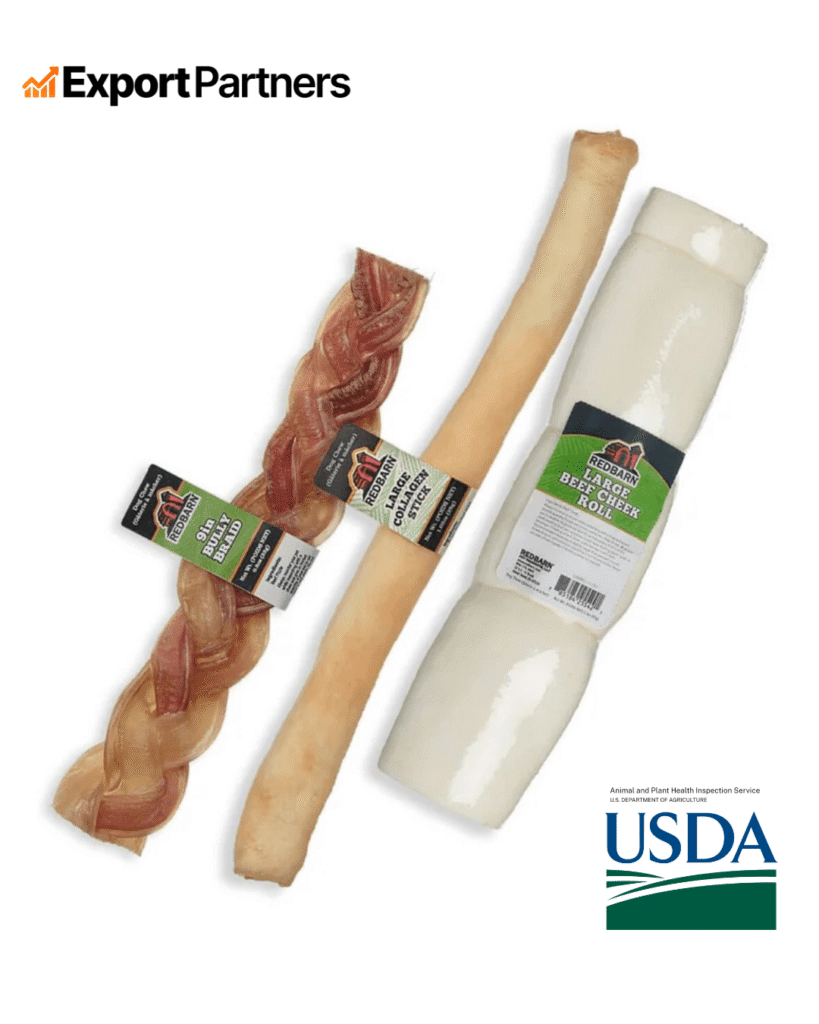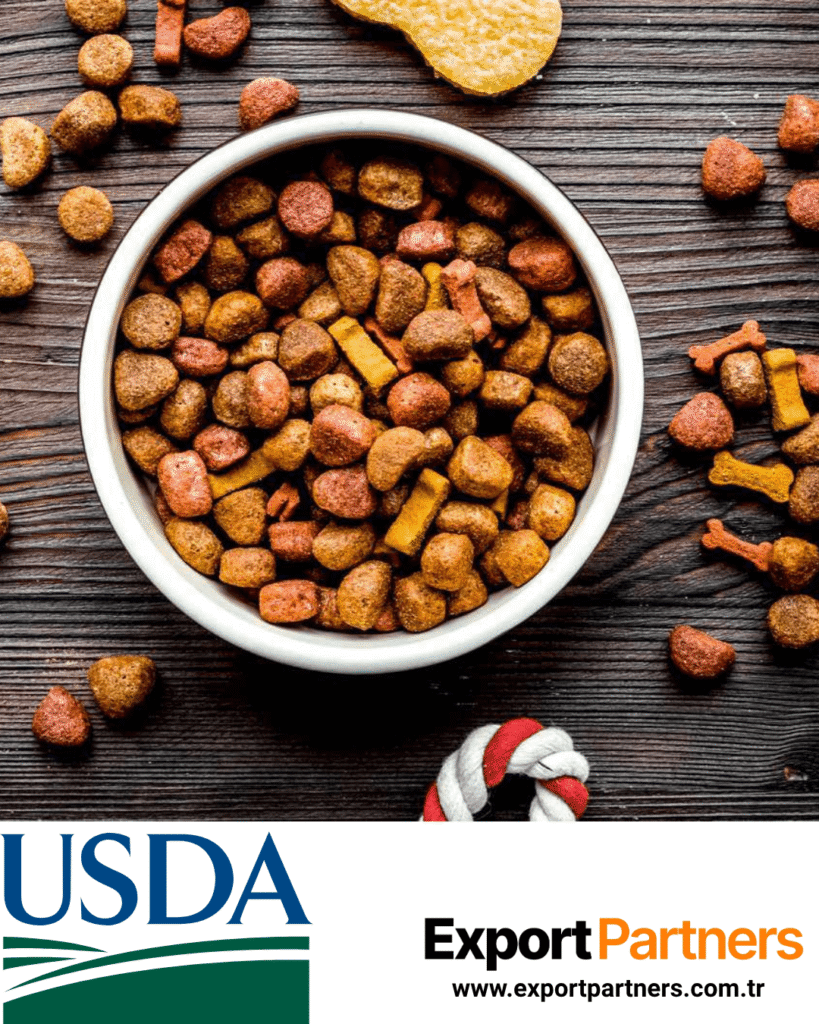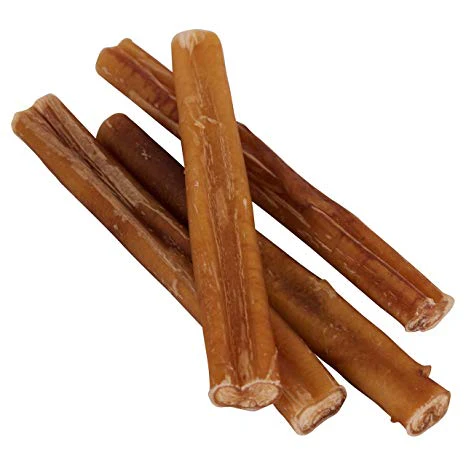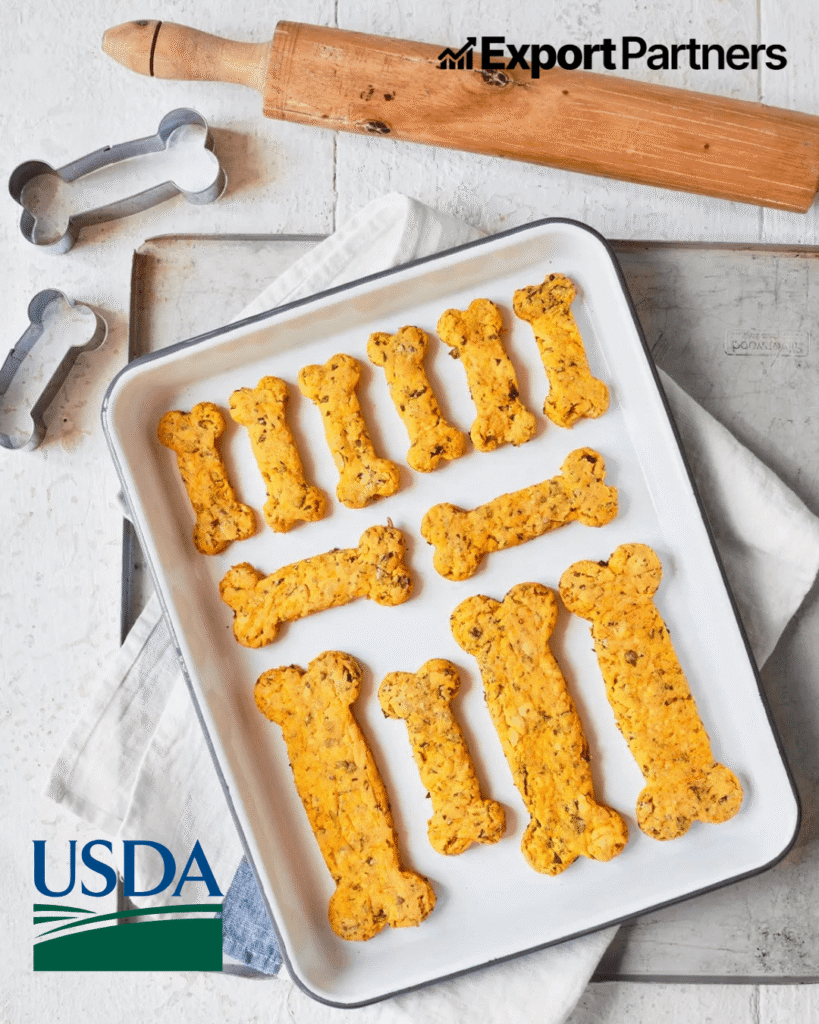
1. The US Pet Food Market: A Giant Ecosystem
The US is the clear leader in the global pet food & pet treats market. By 2025, the US pet food market is valued at over $65 billion and is growing at an average of 6% to 8% per year. In particular, demand for Natural Dog Chews and Pet Plant-based foods has been growing rapidly in recent years.
Pet owners prefer products that are free of chemical additives, sustainably sourced and support animal health. There are approximately 90 million dogs and 110 million cats in the US. - This means that one in every two households has a pet, and this large market is a strong base for the growth of natural and plant-based products.

Consumers are no longer just looking for "cheap formula", but for natural, sustainable, additive-free and cruelty-free products.
This shift has created particularly strong demand for the following three categories:
- Bully Stick Natural chewing sticks made from dried bovine penis
- Dog Chews: Animal or plant-based long-lasting chews
- Plant-Based Pet Treats: Completely plant-based treats
For countries with strong food processing infrastructure such as Turkey, these segments offer a high value-added and low-competitive export opportunity.
2. US Regulations: The Difference Between FDA and USDA
Any manufacturer wishing to export pet food or pet treats to the USA must comply with the FDA (Food and Drug Administration) or USDA (United States Department of Agriculture), depending on the content of the product.
A. Products with Animal Ingredients (Bully Stick & Dog Chews)
Since these products are of animal origin, they are subject to USDA Veterinary Services (VS) authorization.
In addition, the producing facility must have FDA Food Facility Registration.
Both FDA and USDA records are checked together by CBP (Customs and Border Protection) during import.
Mandatory Documents:
- FDA Food Facility Registration
- USDA VS Import Permit
- Veterinary Health Certificate (approved by the Turkish Ministry of Agriculture)
- COA (Certificate of Analysis)
- Label compliance review - "Not for Human Consumption" warning mandatory
Without these documents, the product cannot pass through US customs.The US customs system evaluates products, especially those containing animal ingredients, within the scope of "biosafety".
USDA Permit Process:
- The origin of the raw material, production method and sterilization temperatures are reported.
- Even if the product is not "human grade", permission can be obtained with the phrase "pet use only".
- The process takes 2 months on average.

Bully Stick - USDA or FDA?
1. Main Supervisory Authority: USDA - APHIS (Veterinary Services)
Yes - the USDA is the main inspection authority.
This is because Bully Stick contains animal tissue, skin or organs (usually bovine penises).
It is therefore categorized as "animal by-product" in US legislation.
In this case USDA - Animal and Plant Health Inspection Service (APHIS) - Veterinary Services (VS) authorization is mandatory.
This is referred to as a VS-16 Import Permit.
The product cannot enter the US until it has been sterilized (e.g., through cooking or high heat).
To summarize:
- Bully Stick products are mainly under USDA control. This is because they contain animal ingredients and require a Veterinary Import Permit (USDA VS Permit) to enter the USA.
- The FDA is usually a secondary agency. If the product is not sold as "food" but only as "animal chew", FDA registration is not mandatory - but it provides additional security.
2. When is the FDA Involved?
The FDA comes into play in two situations
A. If the product is classified as "pet food", i.e. has a nutritional value claim:
For example, if the label says "high protein treat", "digestible chew", "supports dental health", etc., the product is now considered "animal food".
This requires FDA Food Facility Registration (FFR).
B. If the manufacturing facility also produces other pet food products:
This means that if the same facility makes formula, treats or fortified chews, it must be FDA registered.
3. Explanation by Simple Example
| Product Type | Supervisory Authority | Required Documents |
| Dried bovine Bully Stick (sterilized, unadulterated) | USDA (VS Permit) | USDA Veterinary Permit + Health Certificate |
| Dog Chew (meat-based) with added or flavored protein | USDA + FDA | VS Permit + FDA Facility Registration + Label Compliance |
| Herbal Dog Chew (vegan) | FDA | FDA Facility Registration + Label Review |
| Treat with formula or vitamin supplements | FDA | FDA Facility Registration + Product Review |
4. Actual Customs Functioning
At US customs (CBP), products are screened by both USDA-APHIS and FDA PREDICT System at the Customs and Border Protection screen.
The system looks at the "intended use" declaration of the product:
- "For animal chew use only" → USDA weighted
- "For animal consumption / treat" → including FDA
In other words, the label, product description and HS code determine which institution is involved.
5. Conclusion - Summary Recommendation
- USDA permit (VS Permit): 100% mandatory
- FDA registration (Food Facility Registration):
- Mandatory if the product is to be considered "as food"
- Only recommended if "chew" and sterilized product → recommended but not mandatory
The safest application:
If USDA + FDA are completed together, you will not receive any "entry hold" or "FDA review required" warnings at US customs.

B. Pet Treats with Herbal Ingredients
For purely plant-based products, the USDA is out of the picture, but FDA regulations apply.
These products usually contain ingredients such as pea protein, chickpea flour, oats, olive oil, vegetable fibers.
Necessary Steps:
- FDA Facility Registration
- Appointment of U.S. Agent
- Label & Ingredient Compliance Review
- Preparation of Nutrition Facts Panel
- Allergen declaration (example: soy, wheat, nuts)
The FDA requires that every statement on labels ("vegan", "natural", "organic") must be provable.
In addition, 21 CFR Part 501 - Animal Food Labeling requires the following information on labels
- Product name (example: "Vegan Dog Chew Sticks")
- List of ingredients (in descending order of quantity)
- Net weight
- Manufacturer name, address, FDA number
3. US Customs Process and Considerations
For pet food exports to the US, it is mandatory to submit an FDA Prior Notice before the products arrive at the port.
This notice allows the FDA to pre-check the shipment electronically.
Export and Customs Process Steps:
- Prior Notice Submission (FDA PN Form)
- USDA or FDA registration verification
- Customs Entry Filing (CBP 3461)
- APHIS inspection (Animal and Plant Health Inspection Service)
- FDA Release (approval)
4. E-Commerce Platforms: Amazon and Shopify
The most attractive sales channels for pet food exporters are Amazon and Shopify.
However, Amazon requires FDA documentation before granting permission to sell, especially in the edible pet product category.
Documents that may be required by Amazon:
- FDA Facility Registration Confirmation
- USDA VS Import Permit (if applicable)
- COA (Certificate of Analysis)
- Label Image and Ingredient List
- Responsible Party (U.S. Agent) information
5. Opportunities and Strategic Advantage for Turkey
Turkey's main advantages in the US market:
| Alan | Turkey's Power |
| Production | Strong food processing technology and meat industry infrastructure |
| Cost | Lower raw material prices compared to Europe |
| Certification | HACCP, ISO, GMP infrastructure available |
| Concept | "Mediterranean Natural Pet Food" has a strong image |
| Geography | Strategic logistics access between Europe - Asia - USA |
In addition, Turkey's domestic chickpea, oat, barley and vegetable fiber resources provide a competitive advantage in the production of plant-based pet treats.
The "eco-friendly pet products" trend is growing rapidly in the US in 2025.
Therefore, "natural pet treats" brands originating from Turkey can be positioned both on Amazon and in the B2B distributor market.
6. Conclusion: Regulatory Compliance Determines Success
Exporting pet products to the US is not only a logistical but also a regulatory management process.
The FDA, USDA and CBP agencies strictly oversee the production, labeling and importation of products.
Rejection of products sent with incorrect or incomplete documentation at the port can lead to both high costs and loss of brand reputation.
Therefore, every manufacturer should carry out the following steps in a professional manner:
- FDA Facility Registration and U.S. Agent designation
- USDA Veterinary Import Permit (for animal products)
- Label & Formulation Compliance Review
- Customs Bond and Importer of Record management
- Amazon Listing Approval or distributor approval

Compatible Export with Export Partners Turkey
Export Partners Turkey, in cooperation with its licensed agents in the USA and Canada, offers the following services from a single point:
- FDA & USDA registration and authorization processes
- Supply of D-U-N-S number
- Label & content compliance review
- Customs Bond & customs consultancy
- Amazon, Shopify and distributor integration
Email us now:
You may be interested in this article; Pet Food and Animal Food Exports to the USA

